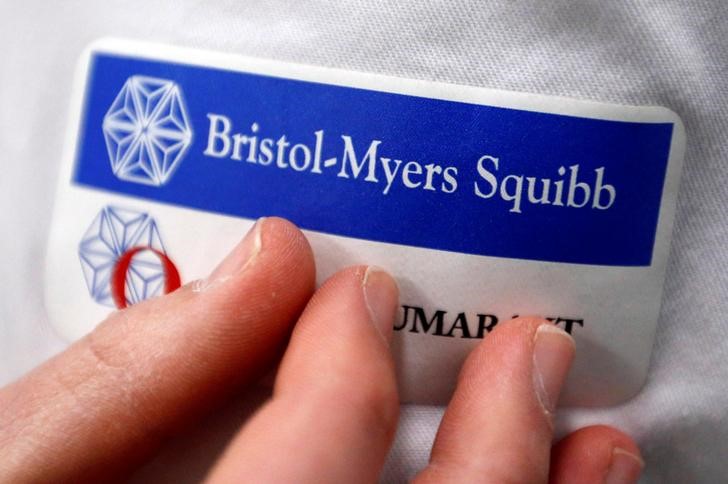On Monday, Barclays (LON:BARC) adjusted its stance on Bristol-Myers Squibb Co. (NYSE:BMY), downgrading the pharmaceutical giant's stock from Equalweight to Underweight while maintaining a price target of $41.00. This revision comes after the company's shares experienced a significant rally, increasing by 25% over the past 11 days, outpacing the broader biotech sector's modest 1.5% gain.
The stock's surge was attributed to several factors, including a broader market rotation favoring lower-multiple pharmaceutical names, a series of positive earnings reports within the sector, Bristol-Myers Squibb's own second-quarter performance that beat expectations, and optimistic interpretations of the company's comments regarding the Inflation Reduction Act's impact on Eliquis, one of its key products.
Despite the recent positive momentum, the analyst expressed concerns about the sustainability of Bristol-Myers Squibb's growth. The company has not provided clarity on its long-term earnings guidance, and the second-quarter earnings beat was perceived as being driven by one-off factors, such as sales of legacy products and stocking dynamics. The analyst pointed out that the reaction to the company's vague comments on the Inflation Reduction Act might be premature, especially considering the patent losses expected in 2028.
The report further highlighted that Bristol-Myers Squibb's underlying challenges remain unaddressed. The company is expected to face eroding revenue and earnings per share after 2026, with a lack of clarity on the trajectory of its recovery.
The analyst noted that potential improvements in Eliquis sales over the next few years could be viewed in the same light as the temporary boosts from Revlimid in the past, which were considered low-quality earnings beats.
Finally, the analyst cautioned that the stock's recent performance might not be sustainable, given the upcoming flow of competitor data and updates, as well as the broader risk of a market rotation reversal. The maintained price target of $41 reflects these concerns and the anticipation of potential headwinds for Bristol-Myers Squibb.
In other recent news, Bristol Myers Squibb reported strong Q2 performance, surpassing analyst expectations with a total revenue of $12.2 billion, a 9% increase from last year.
Despite a decline in net earnings, the company's adjusted earnings stood at $2.07 per share, outstripping the estimated $1.63 per share by analysts. Bristol Myers has revised its full-year earnings forecast, now expecting 60 to 90 cents per share, up from the previous estimate of 40 to 70 cents per share.
Meanwhile, Deutsche Bank (ETR:DBKGn) has reduced its price target for Bristol Myers Squibb to $45 from the previous $53 while retaining a Hold rating. The bank noted that the company's non-GAAP earnings per share of $1.58 fell short by $0.03, partly due to underestimated expenses in in-process research and development.
The European Medicines Agency (EMA) has commenced the review of Bristol Myers Squibb's applications for Opdivo in combination with Yervoy as a first-line treatment for adults with advanced hepatocellular carcinoma and a subcutaneous injection form of Opdivo.
The U.S. Food and Drug Administration (FDA) also granted approval to Bristol Myers Squibb for its combination therapy designed to treat colorectal cancer in patients who have a specific genetic mutation.
However, Bristol Myers Squibb, along with Sanofi (EPA:SASY) (NASDAQ:SNY), has been ordered to pay over $916 million to the state of Hawaii due to allegations of failure to adequately warn non-white patients about potential health risks associated with the blood thinner Plavix. Both companies plan to appeal the decision. These are some of the recent developments at Bristol Myers Squibb.
InvestingPro Insights
Bristol-Myers Squibb Co. (NYSE:BMY) has seen a notable rally in its stock price, yet the broader outlook presents a mix of strategic maneuvers and market anticipations. An InvestingPro Tip highlights that the company has been aggressively buying back shares, a move often seen as a signal of management's confidence in the company's value. Additionally, another tip points out that Bristol-Myers Squibb has maintained dividend payments for an impressive 54 consecutive years, which could be a reassuring factor for income-focused investors.
From a data perspective, Bristol-Myers Squibb's market capitalization stands at $102.28 billion. The company is trading at an adjusted P/E ratio of 13.85 for the last twelve months as of Q2 2024, which may be considered by some investors as a sign of a potentially undervalued stock, especially when paired with a strong free cash flow yield as suggested by another InvestingPro Tip. However, the stock's price/book ratio of 6.01 indicates that it is trading at a higher multiple of its book value, which could suggest a premium compared to industry peers.
Investors looking for more comprehensive analysis and additional InvestingPro Tips can find them at https://www.investing.com/pro/BMY. There are 11 more tips available, which could provide deeper insights into the company's financial health and market positioning. For those interested in accessing these exclusive insights, use the coupon code PRONEWS24 to get up to 10% off a yearly Pro and a yearly or biyearly Pro+ subscription.
This article was generated with the support of AI and reviewed by an editor. For more information see our T&C.
